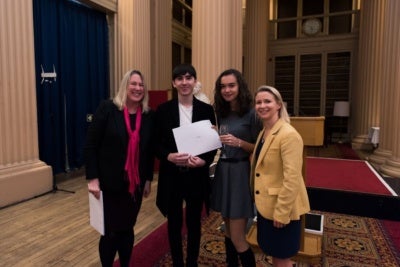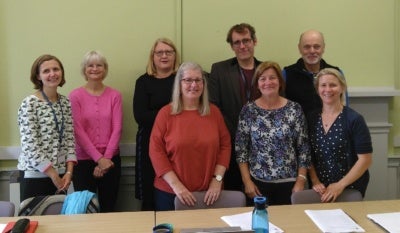Young people studying business today face an incredible challenge—and opportunity. Our ecological, biological, and social systems are under intense pressures that demand new and creative collaborations and inventive ways to reach across our polarized society. That’s the spirit at the heart of the Aspen Institute’s Ideas Worth Teaching Awards. As we kick off nominations for the 2020 Awards cohort, we spoke with a 2019 Ideas Worth Teaching Award winner whose teaching approaches the needs of undergraduates with particular enthusiasm. Sarah Ivory, Lecturer in Climate Change and Business Strategy, describes how she built Global Challenges for Business into a cornerstone of the core curriculum at the University of Edinburgh Business School.
This course is required for first-year undergraduates of the business school. How are you hoping this course will influence the rest of students’ academic experience and how did you get buy-in from the University administration for it?
This course is our students’ first introduction to being a university student. That means it sets expectations: of what university is like, what university expects of them, what they have to offer a university learning environment, and whether (and how much) their own voice is valued in such an environment. One issue we used to face was that students approached their learning in a passive way: I’ll sit, you teach. This course rejects that approach, not with a stick, by forcing a different approach through assessment or exam expectations, but with a carrot, by valuing our students’ engagement and helping them to see their own value.
While I established this course three years ago and designed the content, the skeleton of the course had already been approved by our curriculum committees, having been conceived by the senior team. I didn’t need to get their buy-in, because they were the ones who recognised that we needed to provide our students with something inspirational and effective. I have had nothing but support from the Dean, Professor Wendy Loretto (pictured here presenting awards at the Global Challenges for Business Awards night which recognises our students’ achievements) as well as the Head of Undergraduate, Professor Mary Brennan. Both were looking to provide the best learning and transition experience possible for our students, and were willing to let me experiment outside of the box. Such leadership is essential from a practical perspective, but also from a personal perspective because I have always felt supported and my effort has always been acknowledged and appreciated.

Global Challenges for Business Awards night, Best Presenter winners (centre), awarded by University of Edinburgh Business School Dean, Professor Wendy Loretto (left) and Dr Sarah Ivory (far right).
You use a blend of lectures, small-group seminars, and workshops in your course. What was necessary to put this unique class structure in place and how does the structure serve your broader vision of the course?
First-year, first-semester students are largely coming straight out of a school environment. While we don’t want to emulate that environment, we do want to offer a more supported transition into independent learning. It is also the case that we have 350 students from vastly different backgrounds, including educational, cultural and family backgrounds. This supported learning structure offers all – irrespective of these backgrounds – a chance to understand and acclimatize to this new environment, and to make the most of their learning opportunity.
The small group teaching is especially important. While I may be the course organizer and lecturer, it is my team of tutors (I am also a tutor myself) who are at the frontline of student learning. It is in small group environments that students start to understand and be pushed to offer their own voice. This group of tutors (some pictured below) includes retired business academics, business people, professors and other senior faculty within the school. This demonstrates the resources the school puts behind the course, but also the personal commitment from these individuals who are largely giving their time because they believe in each and every one of their students. I see part of my role as ensuring my tutor team is given the best support possible, and also learning from them each year to improve the course. Happy, committed and stimulated tutors, guiding small groups of students in seminars and workshops, make for inspired, hard-working and confident students.

Global Challenges for Business tutor team including Dr Sarah Ivory (far right).
It’s interesting that your course places lectures on mental health in the workplace alongside environmental disruption and digital disruption. With so many global issues that impact and are impacted by business, how do you make choices of which topics to focus on?
This is one of the most difficult things we face each year! A number of factors influence the global challenges we focus on. We are responsive to our student body: did a topic resonate with them and lead to greater learning and understanding? Or did it miss the mark and so could we alter either how we teach that topic, or what topic we choose, next year? As course leader, I feel a great sense of responsibility for the ideas we are introducing to these students, and the manner in which we are discussing them. My tutor team is chosen carefully to ensure they all share that sense of responsibility. We need to discuss difficult topics with care and humanity, while not shying away from the complex business issues they raise.
The mental health example is a good one. I am very aware that many of my students are facing one of the greatest personal transitions certainly of their lives to date, but possibly that they will ever face. For many this means moving out of home, and for some moving to a different city or even country. Underlying mental health issues can become significant at this time of their lives. Moreover, with the welcome destigmatization of mental health, most students will know of someone who is impacted by these issues. That said, the reason this is a global challenge for business is that it is a very difficult issue to address. For example, some people argue mental health should be treated the same as physical health issues. But how would that work exactly? And what about issues of privacy? To what extent should an employer have a right to someone’s mental health history? In what occupations would this be considered acceptable (because they have the potential to cause harm, such as pilots)? But where does this list of occupations end? How can a business act in the best interests of everyone? Or will it have to make difficult choices? These are the questions our tutor team leads discussions about. This specific seminar, which comes later in the semester, is one in which we often see our students start to really grapple with the complexity of the business environment, and the fact that there are rarely easy or ‘right’ answers.
As alumni from your course go into leadership positions across industries and sectors, what is the one lesson that you hope will stick with them throughout their careers?
Am I allowed to give two lessons I hope will stick with them?
The first is that the business environment (indeed, all environments) are complex. Decisions aren’t easy. There are no (or at least very few) right answers. A critical thinker – as many successful business people are – needs to develop quality arguments, based on strong evidence, and communicate these clearly. These are the three aims of critical thinking which we weave throughout the course, and which form the focus of my forthcoming book (Becoming a Critical Thinker) with Oxford University Press which is aimed at helping undergraduate students develop their skills in these three key areas. So the first thing I want students to remember is that our job in business is not to find the ‘right’ answer to the question about expanding a product line, developing a sustainability strategy, investing in a new start-up or closing down a factory. Our job is to develop a Quality of Argument, supported by Strength of Evidence, and presented with a Clarity of Communication. Once we remove the expectations of getting the ‘right’ answer, we can better engage with the complexity and challenges we face.
The second lesson, though, is possibly more important than this. I simply want my students to remember that all humans matter, and everyone – even in a business context – can be treated with respect and compassion. That even in complex arguments, and with outcomes in which one group won’t get want they want, we can still act with integrity. More than that – given a university education is not available to everyone in the world – we have a responsibility to use that education in a way which advances society, in a way which respects humans but also our environment. I’m not sure this is something you can directly teach. It certainly isn’t something that you can say in a lecture and assume is ingrained. As Jim Henson said: “Kids don’t remember what you try to teach them. They remember what you are.” I – and my whole tutor team – try to be intellectual, critical thinkers who also display compassion, understanding and respect for each individual we engage with and for the individuals we discuss during seminars. My greatest hope is that all of my students take that sense of humanity with them throughout their careers.

Global Challenge for Business students: Group Poster presentations assessment: NFL concussion scandal.
- You can read more about Dr Ivory’s thoughts on her undergraduate course Global Challenges for Business here: https://www.teaching-matters-blog.ed.ac.uk/wherefore-art-thouundergraduate-education/, and her views on best pedagogy practice here: https://www.teaching-matters-blog.ed.ac.uk/you-can-teach-all-the-students-some-of-the-time/
- Find Dr Ivory’s profile and contact details here: https://www.business-school.ed.ac.uk/staff/sarah-ivory, or follow her on Twitter @drsarahivory
![]()
Interested in more innovative insights for business education? Browse our complete collection of interviews with outstanding educators, and subscribe to our weekly Ideas Worth Teaching digest!

